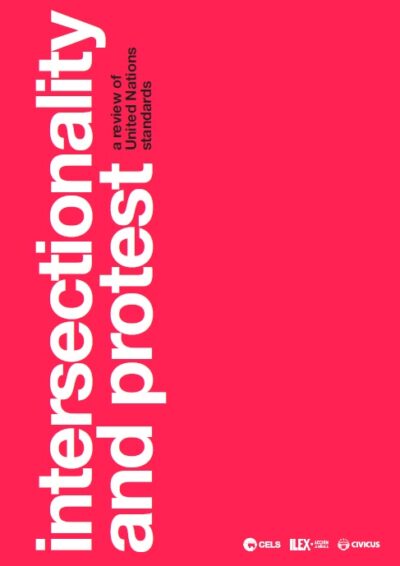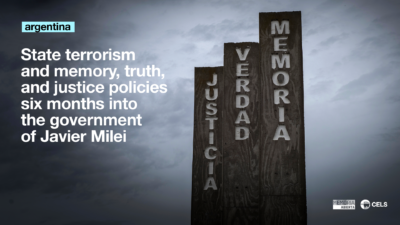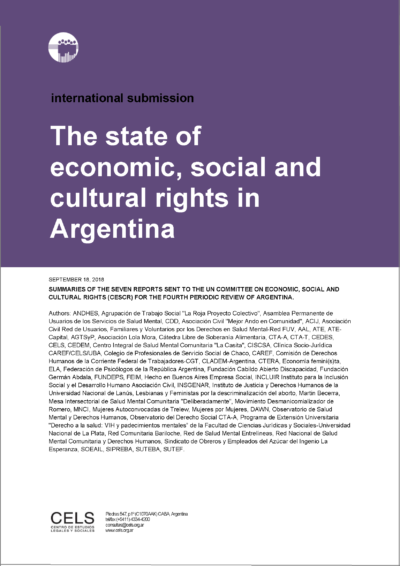Detention of Migrants in the maximum security prison of El Salvador: Urgent appeal to the UN
Labeled as terrorists without any judicial process, at least 260 people were deported from the US and detained in the Salvadoran CECOT after an agreement between Trump and Bukele. Together with organizations from around the world, we call on the UN Security Council to investigate the situation and demand the releases
Argentina must protect social mobilization, not silence it
More than 35 international and regional organizations call on the argentine government to comply with its international obligations on the right to protest and to investigate the police action on March 12. They also express their solidarity with the demand of decent pensions and concern about the rise of authoritarianism in Argentina.
Repression as policy: Violence, arbitrary detentions, and the use of dangerous weapons in Argentina
The mobilization outside Congress demanding a pension increase on March 12 was violently repressed in a large-scale operation involving five security forces. Security Minister Patricia Bullrich had warned in advance that there would be repression. Tear gas, rubber bullets, and arbitrary detentions marked a day in which the government justified its actions by invoking the narrative of an “attempted coup.”
IACHR Hearing: State fails to address refugee and asylum issues
CAREF, CELS, and the Jesuit Migrant Service (SJM) called on the Inter-American Commission on Human Rights (IACHR) to urge the Argentine government to repeal Decree 942/2024, as it undermines due process guarantees and the right to seek and receive asylum. Furthermore, we emphasized that the State must uphold its obligations regarding the rights of refugees and asylum seekers and, in particular, ensure the competence of the officials responsible for adjudicating asylum claims.
IACHR Hearing: State denies responsibility for December 2001 killings and repression
The Argentine State withdrew its previous acknowledgment of responsibility for the repression carried out in 2001, which it had accepted in 2023. Officials declined to answer questions regarding the State’s new assessment of the events that occurred in December 2001. The events of December 19 and 20, 2001, were an extreme manifestation of state violence following the unjustified declaration of a State of Siege.
Intersectionality and protest
Autor/a: CELS, ILEX, CIVICUS
16 pages
ver más
Julio García Romero vs. Ecuador: CELS and RFK Human Rights appear as amicus curiae before the Inter-American Court of Human Rights
The case was heard in a public hearing nearly 20 years after the Chilean journalist’s death, caused by tear gas used by Ecuadorian police during a protest crackdown.
For the land: A documentary series about agribusiness and human rights
Four episodes, four countries, four stories that show how the use of pesticides affects health, access to land and environment of different communities in Argentina, Bolivia, Paraguay and Brazil.
IACHR: Argentina’s government appears aggressive and ill-prepared in hearings on human rights protections
The representative from the La Libertad Avanza administration claimed poverty is decreasing but could not provide any specifics regarding social policies for children and adolescents. Nor did he address the provision of medical supplies to guarantee sexual and reproductive health. Additionally, he denied the existence of gender-based violence. During the hearing on memory policies, he attacked human rights organizations, accusing them of seeking revenge for the last military dictatorship.
Milei’s government fails to guarantee children’s rights
This is what the UN Committee on the Rights of the Child said in its evaluation of Argentina. The Committee expressed concern about the official decision not to distribute food and funds to soup kitchens and community spaces. It also criticized the increase in child poverty, the repression of protests and the bill to lower the age of criminal responsibility.
We denounced the attack on memory policies before the United Nations
Human rights organizations held a meeting with the UN Working Group on Enforced Disappearances where we warned about this government’s regressive speech and measures against the policies of memory, truth and justice.
From head to toe: the criminal use of less lethal weapons in social protests in Latin America
Autor/a: CELS & Temblores
51 pags.
ver más
The Government reaffirmed its policy of criminalizing protests and defended its use of repression before the IACHR
During a public hearing requested by human rights, labor, and social organizations, representatives from the Inter-American Commission on Human Rights (IACHR) and the United Nations expressed their concerns about the use of force, arbitrary detentions, the Ministry of Security’s protocol, and the stigmatization of demonstrators and social organizations.
Letter to German government: Milei’s measures about public politics and human rights for women and LGBTTIQ+ community
In view of Argentine President’s visit to Germany, more than 60 feminist organizations would like to share information on the situation of women’s rights since this government took office.
We denounced the restrictions on the right to protest before the IACHR and the UN: detentions combined with an arbitrary and dangerous escalation of punitive measures
This came after the repression of thislast week’s protest against the “Bases and Starting Points for the Freedom of Argentines” Bill in Congress. More than 30 people were arbitrarily detained and later accused by the prosecution of serious crimes against democratic order, echoing the government’s accusations of terrorism and an attempt to overthrow the government.
AMIA bombing: landmark ruling by the Inter-American Court of Human Rights condemns Argentine state
The international tribunal confirmed that the Argentine State is responsible for violating the human rights of the victims and their families, and the collective right to truth, and must commit to investigations and reparation measures. Joint statement from Memoria Activa and CELS.
State terrorism and memory, truth, and justice policies six months into the government of Javier Milei
Autor/a: CELS & Memoria Abierta
15 pages
ver más
Complaint against Bayer AG filed with the OECD for systematic human rights violations and environmental damages
Based on extensive research and numerous interviews, an alliance of six civil society organizations from Argentina, Brazil, Paraguay, Bolivia and Germany are submitting an OECD complaint against this company for the serious impacts of industrial agriculture in South America.
UN urges government to review the omnibus bill and protocol, saying they criminalize protest
The special rapporteurs expressed their concern over the Ministry of Security resolution and proposed legal reforms criminalizing protest. They called on the Argentine State to comply with international human rights standards.
With more than 1,700 signatures from organizations, we condemn the protocol against protest before the UN and the IACHR
Jointly with trade unions, social movements, human rights organizations, and entities focused on social, trade, environmental, indigenous, migrant, transfeminist, religious, children’s, student, and political causes, we have requested international mechanisms to demand the Argentine State stop the implementation of new regulations that seek to restrict and repress public protest. These submissions were also supported by 15,000 individual signatures.
CELS provided the Inter-American Court of Human Rights with information about the right to care
In collaboration with other organizations, we submitted our contributions to the Court’s Advisory Opinion on the right to care. This process began after the Argentine state requested the Court pronounce on the content and scope of care as a human right and its connection to other rights.
We denounced before the IACHR the increase in indiscriminate use of less lethal weapons to suppress protests
With over 20 international and regional organizations we questioned the irregular and disproportionate use of these weapons by security forces and their serious consequences on health and human rights of people who exercise their right to protest.
We call for peace and ceasefire in Gaza
We endorsed a note to international organizations signed by more than 185 civil society organizations calling for an immediate ceasefire by Israel in Gaza, as well as urgent humanitarian measures.
IACHR: Request for a visit to Argentina to assess violations against indigenous peoples
Rights organizations and representatives of indigenous communities highlight an increase in violence and structural racism by the state, denial of access to territory, lack of prior consultation and the critical situation in the province of Jujuy.
2023 Emilio Mignone International Human Rights Award: nominations are open
Candidates will be admitted from July 10 to September 15, 2023. The award is inspired by the life and work of a founding member of CELS.
Guatemala: We call for the electoral process to be respected.
The national elections on June 25 were suspended by the courts. Almost two hundred organizations urge the State of Guatemala to take the necessary actions to ensure the integrity of the electoral process.
Migrants: serious human rights violations at international borders
Alongside 195 organizations worldwide, we demand that the UN establish an independent monitoring mechanism to investigate the treatment of migrants in border areas and its underlying structural causes.
We filed a complaint against a company in the Techint Group for the disappearance of two human rights defenders in Mexico
The complaint was filed jointly with their families and organizations from Mexico and Luxembourg. We requested that urgent and necessary measures be taken in the search for lawyer Ricardo Lagunes Gasca and Antonio Díaz Valencia, who have not been heard from since mid-January. They disappeared after a community assembly regarding the Ternium company’s failure to make payments to the community for its mining activity.
Brazil: the threat of the anti-democratic far right
The move to action by these groups is a call for reflection and urgent action. What happens when democracies provide the tools and possibilities for some groups to seek to limit or do away with those same democracies? And what tools do we have to defend democracy in the face of attacks like this one?
Criminalization of LGBTI+ people: petition before IACHR to guarantee rights
On October 28 we took part in the thematic hearing as members of the LGBTI+ Litigators of the Americas Network alongside other organizations from the region. We put in an urgent call for reform of Argentina’s drug law and repeal of the misdemeanor codes that allow the criminalization of sex trafficking in public spaces.
At the final hearing before the Inter-American Court for the AMIA bombing, the Argentine State acknowledged its responsibility
On October 13-14, the final hearing was held in Montevideo, Uruguay in the case filed by CELS and Memoria Activa in 1999 charging the Argentine State with international responsibility for the attack on the AMIA Jewish Community Center in Buenos Aires.
Right to protest: meeting of Latin American organizations
On July 25-27 we held an event in Buenos Aires to debate current reality in our region with colleagues from Brazil, Colombia, Chile, Honduras, Ecuador and Mexico.
Continental actions for migration with rights and dignity
A group of organizations in the region urge the governments that signed the Los Angeles Declaration on Migration and Protection to put these commitments into action to defend the rights of migrants, asylum seekers and refugees.
Campaigners petition UN to investigate racial and gender discrimination in global COVID-19 vaccine roll-out
US, UK, Germany, Norway, and Switzerland in violation of international human rights law in “prolonging the pandemic” ahead of vital World Trade Organisation meeting .
Milagro Sala: New complaint submitted to Inter-American System
We submitted our complaint against the Argentine State for the process of harassment and criminalization that Sala and the Tupac Amaru organization have suffered since her arrest in 2016. Government policy in Jujuy reaches much further, seeking to demobilize and limit the right to protest.
AMIA attack: We ask that Argentina be held responsible and the case be sent to the Inter-American Court
On November 11, a pleading hearing in the AMIA case took place at the 174th session of the Inter-American Commission on Human Rights (IACHR), held in Quito, Ecuador. The participants in the hearing included Diana Wassner de Malamud and Adriana Reisfeld, from the Memoria Activa association of family members of AMIA victims, as well as … Continued
Chile: Preliminary report by an international human rights mission
The mission visited Santiago, Valparaíso and Temuco to meet with human rights and civil society organizations and other groups, as well as state institutions. The initial result is a report that provides a survey of human rights violations and recommendations for the Chilean state.
25 years without justice for the AMIA bombing
The scheming behind the AMIA case is still present and explains many of the problems that concern us today. The pacts between the judicial, political, intelligence and media sectors that built the impunity around the bombing have never been broken, nor have ways of doing things been transformed.
Intimidation of Brazilian human rights defenders engaging with the UN
During two side events at the United Nations, Jean Wyllys and Luciana Zaffalon were intimidated by Brazilian officials.
The impact of new authoritarianism on human rights
Representatives of various organizations gathered in Geneva discussed the situation in the United States, the Philippines and Brazil, in light of authoritarian governments that have a sharp anti-rights discourse.
The United Nations recognizes the rights of peasants
The Declaration on the Rights of Peasants and Other People Working in Rural Areas promotes measures to guarantee access to land, the protection of seeds in light of their commodification and a stop to evictions, among many other issues.
The Global Compact for Migration was adopted
More than 160 UN member countries endorsed the Global Compact for Migration at an intergovernmental conference held on December 10-11. This agreement includes some important advances, above all in a context of growing xenophobia and nationalism in Latin America and the world.
IACHR sounds alarm over rising militarization in the region
In a hearing they described as “historic,” members of the Inter-American Commission on Human Rights (IACHR) affirmed that the militarization of public security leads to an exponential increase in human rights violations. They also cautioned about the return of the national security doctrine in the region.
Militarization of the region at the IACHR
The militarization of public security is on the rise across the Americas, with very troubling consequences. For that reason, 17 organizations from 10 countries requested a regional hearing before the Inter-American Commission on Human Rights (IACHR), which will be held on December 6.
Urgent action needed over US threats to the International Criminal Court
US National Security Adviser John Bolton made explicit and concrete threats against ICC judges, prosecutors and personnel if they proceed with an investigation into alleged war crimes committed by US forces in Afghanistan. A group of national and international organizations requested that the UN Assistant Secretary-General for Human Rights take urgent action in response. Our joint letter to him follows.
The state of economic, social and cultural rights in Argentina
Autor/a: Various
10 pgs.
ver más
INCLO welcomes historic win against UK mass surveillance
In a landmark win for seven members of the International Network of Civil Liberties Organizations (INCLO), the European Court of Human Rights ruled that the UK’s mass surveillance practices violate privacy and freedom of expression. CELS joins all its fellow INCLO members in celebrating this victory.
Institutional violence and gender-based violence: A year without Ivana Rosales and another year without reparation
Thirty-five organizations published an open letter demanding that the Argentine state and Neuquén province fulfill the commitment they made to Ivana Rosales before the Inter-American Commission on Human Rights. Her daughter continues to demand justice, a year after Ivana’s death.
Milagro Sala: Supreme Court ordered that Jujuy’s judiciary comply with the Inter-American Court’s provisional measures
In a unanimous ruling, the Argentine Supreme Court enjoined the judiciary of Jujuy province to urgently adopt the measures needed to safeguard the life, personal integrity and health of Milagro Sala, as ordered by the Inter-American Court of Human Rights.
Global Compact for Migration: Progress, shortcomings and the way forward
The new Global Compact represents a turning point in the international management of migration. But much work remains to ensure that its implementation is focused on the protection of the rights of migrants.






